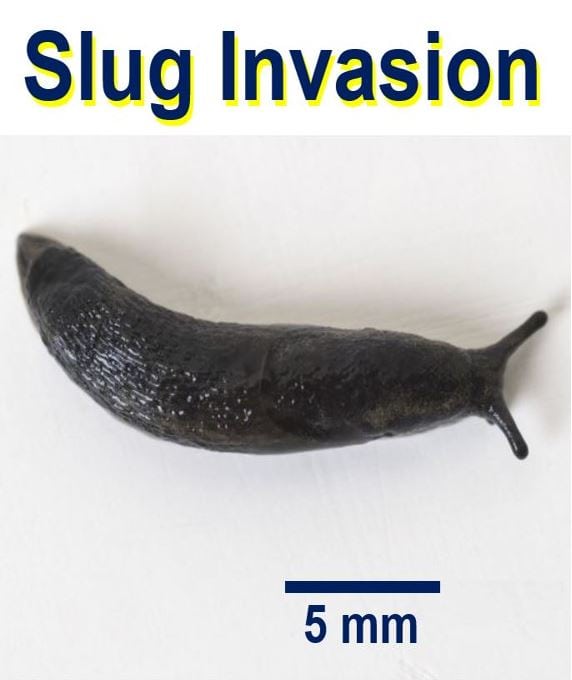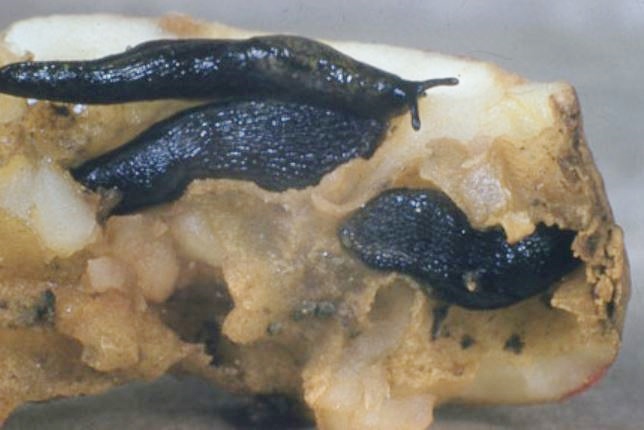British gardens are soon to be invaded in a big way by an army of slugs that never sleep, says invertebrate conservation charity BugLife, which explained that after one of the warmest winters in recorded history, the population of sleepless slugs in the UK is exploding.
These sleepless slugs – seemingly shell-less terrestrial gastropod molluscs – will be invading our gardens during the summer of this year, experts predict. All they do day and night is eat and reproduce – they don’t sleep!
Over recent months, temperatures have not dropped low enough to send these hungry little creatures into hibernation.
 Slugs are not fussy eaters. They’ll consume just about anything they come across as they inch their way across your garden or flower box. They prefer young, tender plants and will eat both the stems and leaves, destroying the whole plant. A large number of slugs can completely destroy a newly planted garden. (Image: slugwatch.co.uk)
Slugs are not fussy eaters. They’ll consume just about anything they come across as they inch their way across your garden or flower box. They prefer young, tender plants and will eat both the stems and leaves, destroying the whole plant. A large number of slugs can completely destroy a newly planted garden. (Image: slugwatch.co.uk)
BugLife, which claims to be the only organisation in Europe devoted to the conservation of all invertebrates, says people across the UK could start to see a slug population ‘explosion’, which could devastate our gardens.
British gardens under serious threat
As long as temperatures stay above 5°C (41°F), slugs remain active, i.e. they do not go into hibernation. Due to the likely record-breaking warm winter, slugs have not gone into their long sleep and have been devouring food and breeding through the cold months.
Would you believe that the average garden in the UK has up to 20,000 slugs? Each one lays as many as 200 eggs per cubic metre. BugLife predicts that the number this year will be considerably greater, at least 10% higher.
Fewer slug-eating animals
Add to the warm weather, which already means a slug population boost, the decline in hedgehogs and other slug-eating animals, and you have the ideal conditions for slug reproduction.
 According to the Royal Horticultural Society, every garden owner must accept some damage from slugs. Regarding controlling populations, the Society writes: “A biological control specific to molluscs, with no adverse effect on other types of animal, is available in the form of a microscopic nematode or eelworm that is watered into the soil.” (Image: rhs.org.uk)
According to the Royal Horticultural Society, every garden owner must accept some damage from slugs. Regarding controlling populations, the Society writes: “A biological control specific to molluscs, with no adverse effect on other types of animal, is available in the form of a microscopic nematode or eelworm that is watered into the soil.” (Image: rhs.org.uk)
Weather experts say December 2015 was the warmest since 1910, when records began, with temperatures averaging about 7.9°C (46°F). In fact, December 2015 felt more like an early-to-middle spring month.
Nobody in the UK complained – who would prefer a bitterly cold December to a mild one? However, like most things in life, the warm winter comes with a price; one of them being a massive slug invasion of our gardens this summer.
The BBC quoted BugLive CEO matt Shardlow as saying:
“Due to climate shifts, warmer winters and wetter summers, we’re seeing slugs become active all year round. Whereas key predators like amphibians will only lay their eggs once a year, slugs are not so restricted.”
“Coupled with the fact that general slug varieties are also reaching full size earlier than ever, gardeners are simply not getting any respite and need innovative management solutions.”
“The impact of super-sized, sleepless slugs could spell devastation for our gardens this summer.”
Better start taking measures now
BBC Radio 4’s Gardeners’ Question Time panelist Pippa Greenwood advises gardeners to spend the bank holiday weekend manually seeking out slugs – ideally during a damp evening, she added.
Ms. Greenwood said:
“Look out for the eggs as well as the slugs themselves. They’re a couple of millimetres in diameter and are often in clumps.”
Laying down natural nematodes, such as roundworms that attack slugs without damaging other fauna or plants, may also help. “You can buy several million at a time off the internet. They’re totally harmless to other wildlife,” she said.
Ms. Greenwood has a web page – Protect Your Plants – with more information on getting rid of slugs.
Video – Natural slug control
This Work With Nature video shows you the top ten natural ways to control slugs and snails.
